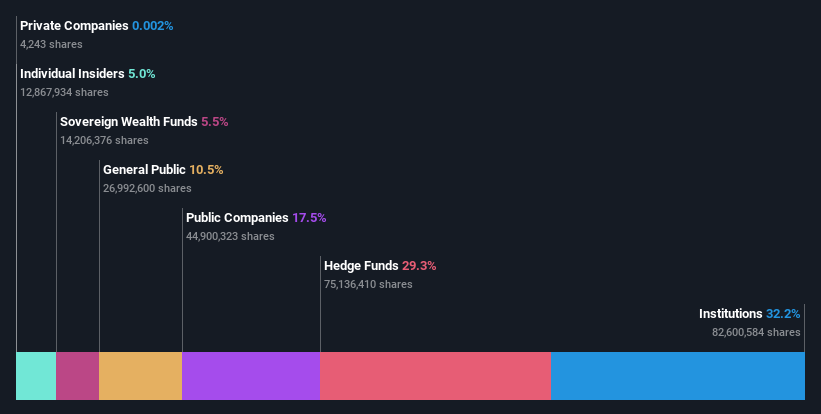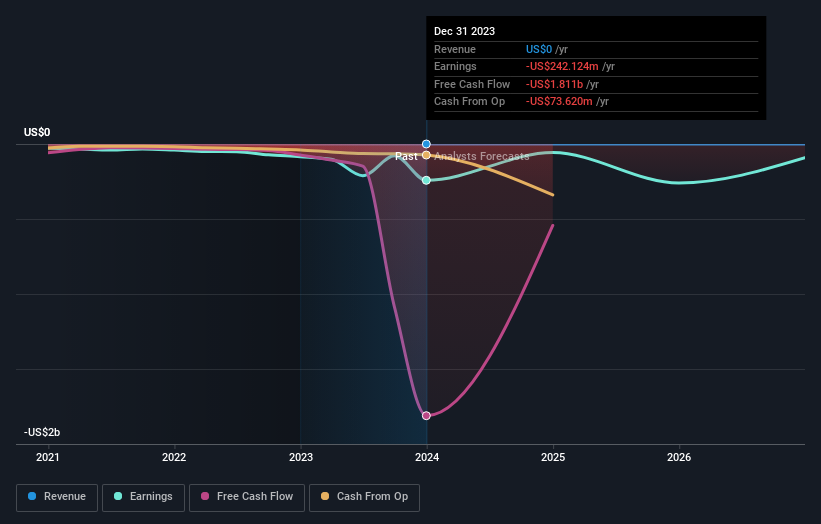- United States
- /
- Oil and Gas
- /
- NasdaqCM:NEXT
NextDecade Corporation's (NASDAQ:NEXT) large institutional owners must be happy as stock continues to impress, up 5.4% over the past week

Key Insights
- Significantly high institutional ownership implies NextDecade's stock price is sensitive to their trading actions
- 53% of the business is held by the top 4 shareholders
- Past performance of a company along with ownership data serve to give a strong idea about prospects for a business
A look at the shareholders of NextDecade Corporation (NASDAQ:NEXT) can tell us which group is most powerful. And the group that holds the biggest piece of the pie are institutions with 32% ownership. Put another way, the group faces the maximum upside potential (or downside risk).
And last week, institutional investors ended up benefitting the most after the company hit US$1.4b in market cap. The one-year return on investment is currently 35% and last week's gain would have been more than welcomed.
Let's delve deeper into each type of owner of NextDecade, beginning with the chart below.
See our latest analysis for NextDecade

What Does The Institutional Ownership Tell Us About NextDecade?
Many institutions measure their performance against an index that approximates the local market. So they usually pay more attention to companies that are included in major indices.
NextDecade already has institutions on the share registry. Indeed, they own a respectable stake in the company. This implies the analysts working for those institutions have looked at the stock and they like it. But just like anyone else, they could be wrong. If multiple institutions change their view on a stock at the same time, you could see the share price drop fast. It's therefore worth looking at NextDecade's earnings history below. Of course, the future is what really matters.

Our data indicates that hedge funds own 29% of NextDecade. That catches my attention because hedge funds sometimes try to influence management, or bring about changes that will create near term value for shareholders. Looking at our data, we can see that the largest shareholder is York Capital Management with 23% of shares outstanding. TotalEnergies SE is the second largest shareholder owning 17% of common stock, and BlackRock, Inc. holds about 6.5% of the company stock. Furthermore, CEO Matthew Schatzman is the owner of 0.6% of the company's shares.
To make our study more interesting, we found that the top 4 shareholders control more than half of the company which implies that this group has considerable sway over the company's decision-making.
While it makes sense to study institutional ownership data for a company, it also makes sense to study analyst sentiments to know which way the wind is blowing. There is a little analyst coverage of the stock, but not much. So there is room for it to gain more coverage.
Insider Ownership Of NextDecade
The definition of company insiders can be subjective and does vary between jurisdictions. Our data reflects individual insiders, capturing board members at the very least. The company management answer to the board and the latter should represent the interests of shareholders. Notably, sometimes top-level managers are on the board themselves.
Insider ownership is positive when it signals leadership are thinking like the true owners of the company. However, high insider ownership can also give immense power to a small group within the company. This can be negative in some circumstances.
Our most recent data indicates that insiders own some shares in NextDecade Corporation. This is a big company, so it is good to see this level of alignment. Insiders own US$68m worth of shares (at current prices). It is good to see this level of investment by insiders. You can check here to see if those insiders have been buying recently.
General Public Ownership
With a 11% ownership, the general public, mostly comprising of individual investors, have some degree of sway over NextDecade. This size of ownership, while considerable, may not be enough to change company policy if the decision is not in sync with other large shareholders.
Public Company Ownership
We can see that public companies hold 17% of the NextDecade shares on issue. We can't be certain but it is quite possible this is a strategic stake. The businesses may be similar, or work together.
Next Steps:
While it is well worth considering the different groups that own a company, there are other factors that are even more important. Consider for instance, the ever-present spectre of investment risk. We've identified 3 warning signs with NextDecade (at least 2 which are a bit concerning) , and understanding them should be part of your investment process.
If you are like me, you may want to think about whether this company will grow or shrink. Luckily, you can check this free report showing analyst forecasts for its future.
NB: Figures in this article are calculated using data from the last twelve months, which refer to the 12-month period ending on the last date of the month the financial statement is dated. This may not be consistent with full year annual report figures.
Valuation is complex, but we're here to simplify it.
Discover if NextDecade might be undervalued or overvalued with our detailed analysis, featuring fair value estimates, potential risks, dividends, insider trades, and its financial condition.
Access Free AnalysisHave feedback on this article? Concerned about the content? Get in touch with us directly. Alternatively, email editorial-team (at) simplywallst.com.
This article by Simply Wall St is general in nature. We provide commentary based on historical data and analyst forecasts only using an unbiased methodology and our articles are not intended to be financial advice. It does not constitute a recommendation to buy or sell any stock, and does not take account of your objectives, or your financial situation. We aim to bring you long-term focused analysis driven by fundamental data. Note that our analysis may not factor in the latest price-sensitive company announcements or qualitative material. Simply Wall St has no position in any stocks mentioned.
About NasdaqCM:NEXT
NextDecade
An energy company, engages in the construction and development activities related to the liquefaction of natural gas in the United States.
Low with weak fundamentals.

